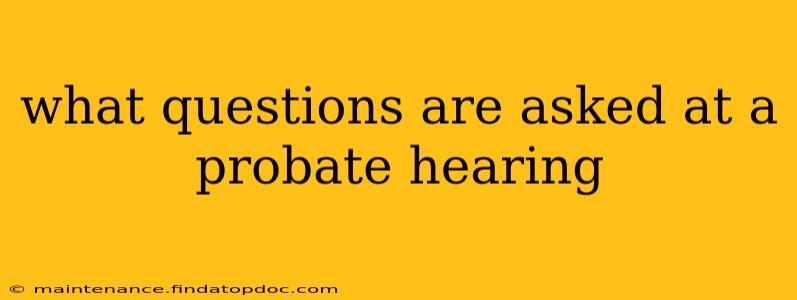Navigating the probate process can be daunting, especially when facing the uncertainty of a court hearing. Understanding what to expect, including the types of questions that might be asked, can alleviate anxiety and ensure a smoother experience. This guide explores common questions posed during a probate hearing, offering valuable insights for individuals involved in the process.
While the specifics of a probate hearing vary depending on the jurisdiction and the complexities of the estate, certain themes and question types consistently emerge. This guide aims to provide a comprehensive overview, but remember to consult with a legal professional for advice specific to your situation.
What is the Purpose of a Probate Hearing?
Before delving into specific questions, it's crucial to understand the purpose of a probate hearing. Generally, these hearings serve to:
- Verify the validity of the will: The court confirms the will's authenticity, ensuring it meets legal requirements and wasn't coerced or forged.
- Appoint an executor or administrator: The court officially designates the person responsible for managing the deceased's estate.
- Address creditor claims: Creditors present their claims against the estate, and the court determines their validity and payment priority.
- Distribute assets: Once debts are settled, the court oversees the distribution of remaining assets to heirs according to the will or intestacy laws.
- Resolve disputes: The court acts as a mediator to resolve any conflicts among heirs or creditors regarding the estate's distribution.
Common Questions Asked at a Probate Hearing:
The questions asked at a probate hearing can be categorized into several key areas:
Regarding the Will:
- Was the will properly executed? This involves verifying the testator's (deceased's) capacity, their signature, and the presence of witnesses.
- Was the testator of sound mind when they created the will? The court assesses the testator's mental state to ensure they understood the consequences of their actions. Evidence of undue influence or coercion may also be explored.
- Is there a possibility of a later will superseding the current one? The court investigates the existence of any more recent wills.
- Are there any challenges to the will's validity? The court addresses any objections to the will's authenticity or contents raised by interested parties.
Regarding the Executor/Administrator:
- Are you qualified to serve as executor/administrator? The court assesses the candidate's ability and willingness to manage the estate effectively and fairly. This includes questions about their financial background and any potential conflicts of interest.
- Do you understand your responsibilities as executor/administrator? The court confirms the candidate understands their legal obligations, including inventorying assets, paying debts, and distributing assets to heirs.
- Do you have any conflicts of interest? The court seeks to ensure impartiality and avoid any potential bias in the executor/administrator's actions.
- Have you already begun inventorying the assets? The court wants to see evidence of proactive estate management.
Regarding the Estate's Assets and Debts:
- What are the assets included in the estate? A comprehensive inventory of assets, including real estate, bank accounts, investments, and personal property, is crucial.
- What are the debts and liabilities of the estate? This includes outstanding loans, credit card debt, medical bills, and taxes.
- Have all creditors been notified? The court verifies that all known creditors have been informed of the probate process and given an opportunity to file claims.
- What is the estimated value of the estate? Accurate valuation is essential for determining inheritance taxes and equitable distribution.
Regarding the Heirs and Beneficiaries:
- Who are the heirs or beneficiaries according to the will or intestacy laws? The court confirms the identities of those entitled to inherit from the estate.
- Are there any disputes among the heirs or beneficiaries? The court addresses any conflicts regarding the distribution of assets or the interpretation of the will.
- Have all heirs been properly notified of the probate proceedings? Due process requires that all relevant parties are aware of the hearing.
What if I Don't Know the Answer to a Question?
It's perfectly acceptable to say you don't know the answer to a question. It's far better to be honest than to provide inaccurate information. If you need time to gather information, request it politely. Remember to always consult with your attorney before responding to any complex legal questions.
This information is for educational purposes only and not legal advice. Consult with an experienced probate attorney in your jurisdiction for personalized guidance. The specifics of your probate hearing will depend on the individual circumstances of the estate.
